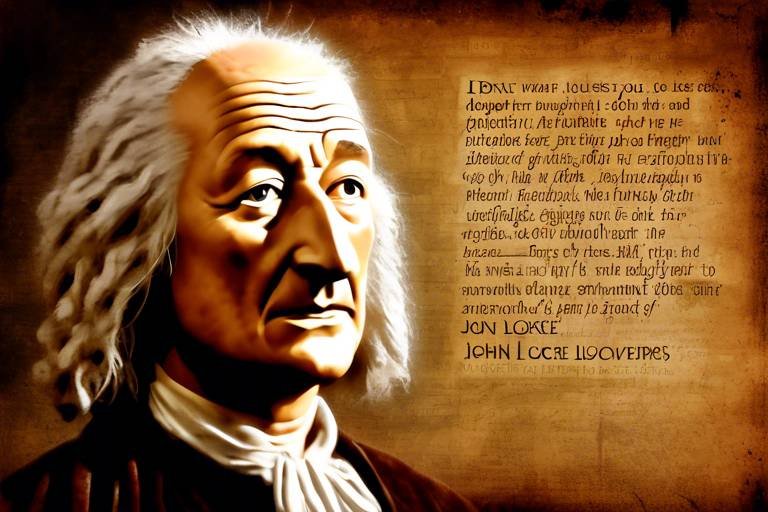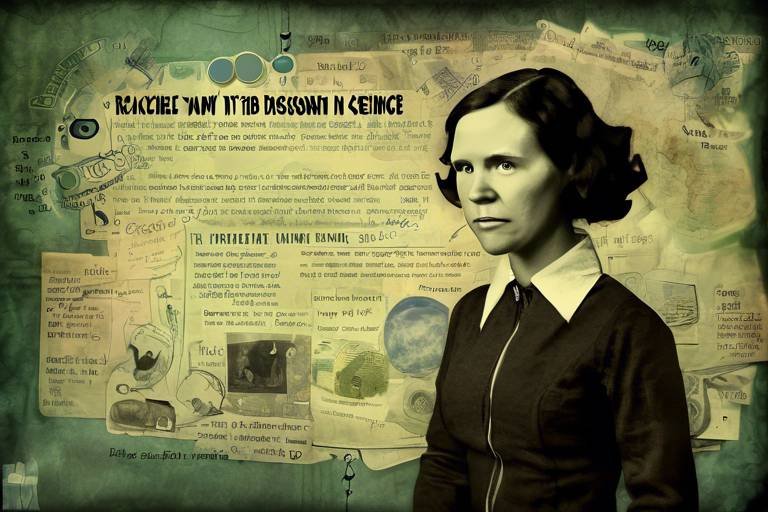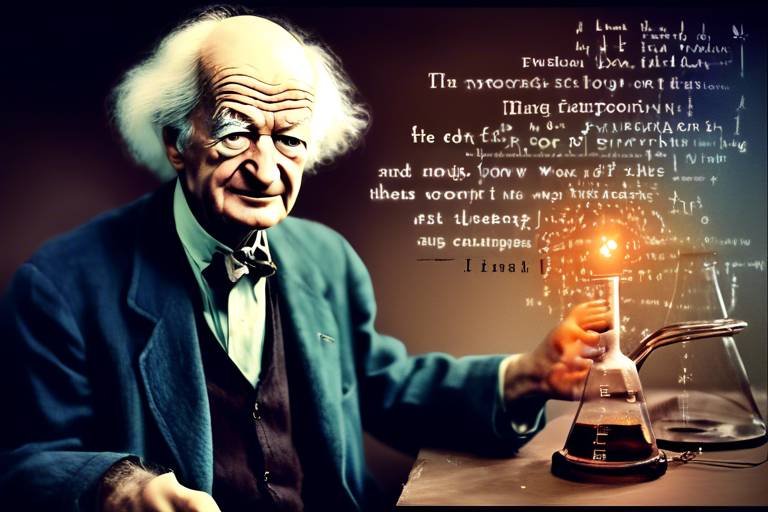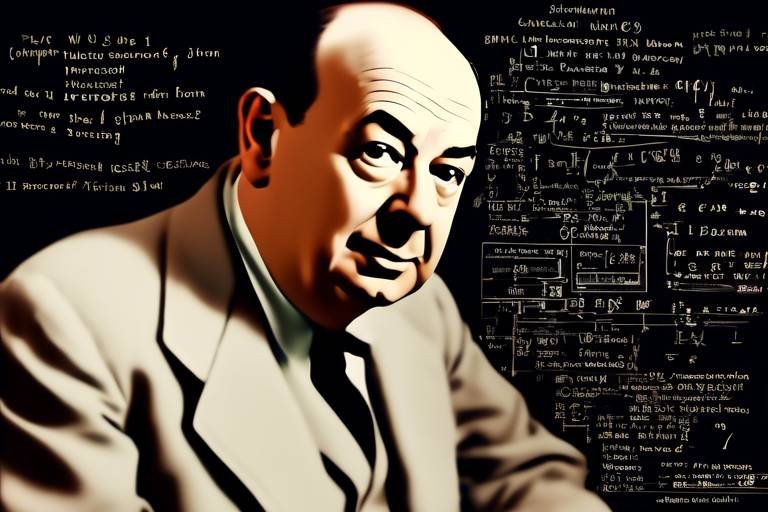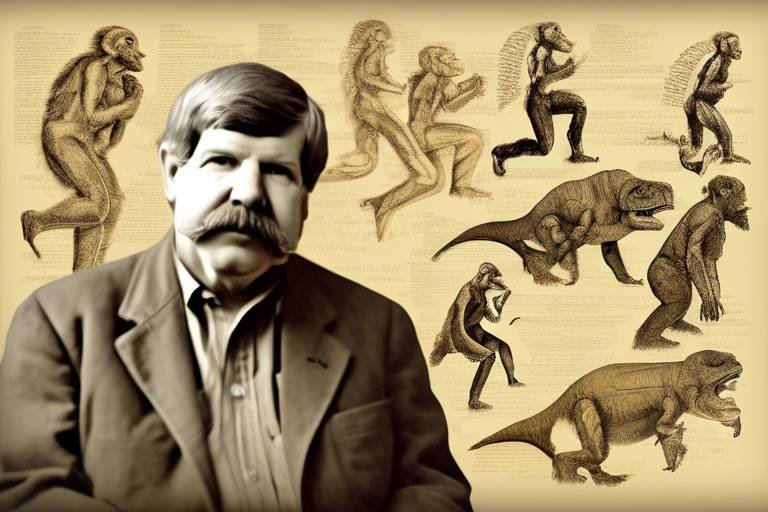The Contributions of John Locke to Philosophy and Science
John Locke, often hailed as the father of liberalism, made profound contributions that reshaped both philosophy and science. His ideas have served as a cornerstone for modern thought, influencing everything from political theory to educational practices. Imagine a world where the foundations of democracy, individual rights, and empirical knowledge were not established—Locke’s work has ensured that such a world remains only a distant possibility. His theories on knowledge, government, and human understanding not only challenged existing norms but also laid the groundwork for a more enlightened society.
Locke's approach was revolutionary. He argued that knowledge is not innate but acquired through experience, a perspective that shifted the focus from abstract reasoning to empiricism. This idea was radical for its time, suggesting that our understanding of the world is built on the sensory experiences we encounter. Just as a painter uses different colors to create a masterpiece, Locke believed that our experiences color our understanding of reality. This perspective opened up new avenues for scientific inquiry and philosophical debate, encouraging thinkers to explore the world through observation and experimentation.
Moreover, Locke’s influence extends beyond epistemology into the realm of politics. His social contract theory proposed that governments derive their authority from the consent of the governed—a concept that has become a fundamental principle of modern democracy. This idea resonates with the belief that power should not be arbitrary but should reflect the will of the people. In a way, Locke’s thoughts can be likened to the blueprint of a house; without a solid foundation, the structure would crumble. His theories provided the necessary framework for the development of political systems that prioritize individual rights and freedoms.
Locke's assertion of natural rights—life, liberty, and property—has been particularly influential. These rights are not granted by any government but are inherent to every individual, shaping the discourse on human rights that we see today. His ideas were instrumental in inspiring the founding fathers of the United States, particularly in crafting the Declaration of Independence. It's fascinating to think about how a few writings from the 17th century could spark revolutions and inspire movements across the globe!
In addition to his political theories, Locke made significant strides in the field of education. He believed that education was the key to personal development and societal progress. His concept of tabula rasa, or "blank slate," suggests that individuals are shaped by their experiences and environment. This idea emphasizes the importance of education in molding character and intellect. Just like a gardener nurtures a seed to grow into a flourishing plant, Locke argued that education cultivates the mind and spirit of individuals, allowing them to reach their full potential.
Locke's advocacy for practical educational methods has also had a lasting impact. He championed experiential learning, arguing that knowledge should not be confined to rote memorization but should involve active engagement and critical thinking. This approach has influenced modern educational theories, encouraging innovative teaching methods that prioritize student involvement. Just as a chef perfects a recipe through practice and experimentation, Locke believed that learning is most effective when it is hands-on and relevant to real-life situations.
In summary, John Locke's contributions to philosophy and science are nothing short of revolutionary. His emphasis on empiricism, natural rights, and education continues to resonate in contemporary discussions and practices. As we navigate an increasingly complex world, Locke’s insights remind us of the importance of individual rights, the power of knowledge, and the necessity of a well-structured society. His legacy is not merely a chapter in history; it is a living testament to the enduring power of ideas in shaping human civilization.
- What is John Locke known for?
John Locke is known for his contributions to political theory, especially his ideas on natural rights and the social contract, as well as his epistemological theories emphasizing empiricism.
- How did Locke influence American democracy?
Locke's ideas about individual rights and government accountability significantly influenced the founding fathers, particularly in the drafting of the Declaration of Independence.
- What is the concept of tabula rasa?
Tabula rasa, or "blank slate," is Locke's theory that individuals are shaped by their experiences, emphasizing the importance of education and environment in personal development.
- What are natural rights according to Locke?
Natural rights, as defined by Locke, are inherent rights that every individual possesses, including the rights to life, liberty, and property.

Locke's Epistemology
When we dive into John Locke's epistemology, we find ourselves at the crossroads of experience and knowledge. Locke, a prominent figure in the empiricist tradition, argued that our understanding of the world is not innate but rather acquired through sensory experiences. Imagine walking into a vibrant garden; the colors, the scents, and the sounds all contribute to your perception of beauty. This is the essence of Locke's theory: that our minds start as a blank slate, or tabula rasa, and are filled with knowledge through our interactions with the world around us.
Locke's assertion that all ideas stem from experience was revolutionary. Before him, many philosophers believed in innate ideas—concepts we are born with. Locke flipped this notion on its head, suggesting that without experience, our minds would remain empty. He categorized knowledge into two types: sensation and reflection. Sensation refers to the direct experiences we have through our senses, while reflection involves the mental processes we engage in when we think about those experiences. For instance, when you taste a delicious meal, the sensation of flavor is one aspect, but reflecting on how it makes you feel is another.
To illustrate this further, let’s break down Locke’s ideas into a simple table:
| Type of Knowledge | Description |
|---|---|
| Sensation | Knowledge gained through direct sensory experience. |
| Reflection | Knowledge gained through mental processes about our sensory experiences. |
Locke's emphasis on empiricism not only reshaped philosophy but also had profound implications for the development of the sciences. By advocating for a systematic approach to knowledge acquisition, he laid the groundwork for the scientific method, which relies heavily on observation and experimentation. This method of inquiry encourages questioning and testing, allowing for a more robust understanding of the natural world.
Furthermore, Locke's belief that knowledge is built upon a foundation of experiences resonates deeply in modern educational practices. Educators today emphasize the importance of hands-on learning and real-world applications, echoing Locke's insights on how we acquire knowledge. Think about it—when you learn to ride a bike, it’s not just about reading a manual; it’s about getting on that bike, feeling the balance, and adjusting based on your experiences.
In summary, Locke's epistemology revolutionized our understanding of knowledge. By positing that all ideas originate from experience, he paved the way for a more empirical approach to both philosophy and science. This shift not only changed how we think about cognition but also influenced various fields, encouraging a culture of inquiry and exploration. So, the next time you ponder a question or seek to understand something new, remember that you’re following in the footsteps of a great thinker who championed the idea that experience is the key to knowledge.

Social Contract Theory
John Locke's is a cornerstone of modern political philosophy, providing a framework for understanding the relationship between individuals and their government. At its core, this theory asserts that governments are not established by divine right or sheer force; instead, they derive their legitimacy from the consent of the governed. This revolutionary idea marked a significant departure from the prevailing notions of authority in Locke's time, suggesting that political power must be justified by the will of the people.
Locke believed that in a state of nature, individuals possess natural rights, which include life, liberty, and property. However, to protect these rights more effectively, individuals agree to form a government through a social contract. This contract is not just a mere agreement; it is a vital pact that outlines the duties and responsibilities of both the government and its citizens. The government is tasked with safeguarding these rights, while the people are expected to abide by the laws established for their protection.
One of the most profound implications of Locke's theory is the idea that if a government fails to protect the rights of its citizens or becomes tyrannical, the people have the right to revolt and establish a new government. This concept of the right to rebellion was radical at the time and laid the groundwork for future revolutions, including the American Revolution. Locke's influence can be traced through history, as his ideas inspired the framers of the United States Constitution and the Declaration of Independence.
Locke's social contract theory can be summarized in a few key principles:
- Consent of the Governed: The legitimacy of government is based on the consent of the people.
- Protection of Natural Rights: The primary role of government is to protect individuals' rights to life, liberty, and property.
- Right to Revolt: Citizens have the right to overthrow a government that fails to uphold its responsibilities.
This framework not only influenced political thought but also shaped the development of democratic principles that we hold dear today. Locke's emphasis on individual rights and government accountability resonates in contemporary discussions about democracy and governance, making his social contract theory a lasting legacy in the realm of political philosophy.
- What is the social contract theory? The social contract theory is a political theory that posits that governments derive their authority from the consent of the governed, and that individuals agree to form a government to protect their natural rights.
- How did John Locke influence modern democracy? Locke's ideas about natural rights and the right to revolt against unjust governments significantly influenced the founding principles of modern democratic societies, particularly in the United States.
- What are natural rights according to Locke? Natural rights are inherent rights that every individual possesses, including the rights to life, liberty, and property, which governments are obligated to protect.

Natural Rights
John Locke's introduction of the concept of was nothing short of revolutionary. He argued that every individual is inherently endowed with certain rights simply by being human. These rights include the fundamental rights to life, liberty, and property, which he believed were not granted by any government or authority but were intrinsic to human existence. This idea challenged the prevailing notions of governance at the time, where monarchs ruled by divine right, and it laid the groundwork for modern human rights discourse.
Locke’s assertion that individuals possess these natural rights fundamentally shifted the conversation around governance and authority. He posited that the primary role of government is to protect these rights, and if a government fails to do so, citizens have not only the right but the duty to revolt. This notion was radical for its time and has echoed through history, influencing countless revolutions and democratic movements across the globe. The idea that the legitimacy of a government comes from the consent of the governed is a cornerstone of modern democracy and continues to resonate strongly in today’s political climate.
To understand Locke's natural rights, we can break them down into three main categories:
- Life: The right to live and not be harmed by others.
- Liberty: The freedom to act according to one’s own will, as long as it does not infringe on the rights of others.
- Property: The right to own and control possessions, which Locke believed was essential for personal freedom and economic prosperity.
Locke's philosophy had a profound influence on the founding fathers of the United States, particularly in the drafting of the Declaration of Independence. Thomas Jefferson famously echoed Locke’s principles when he wrote about unalienable rights, drawing directly from Locke’s framework of natural rights. This connection illustrates how Locke's theories transcended his own time, becoming a vital part of the narrative of freedom and democracy that defines the modern world.
In conclusion, Locke's ideas on natural rights not only reshaped political thought in his era but also established a framework that continues to guide discussions about human rights today. His belief that all individuals are entitled to these rights has inspired countless movements advocating for justice and equality, proving that his legacy is as relevant now as it was in the 17th century.
- What are natural rights according to John Locke?
Natural rights, as defined by Locke, are inherent rights that every individual possesses, including rights to life, liberty, and property. - How did Locke's ideas influence modern democracy?
Locke argued that governments derive their authority from the consent of the governed, which has become a foundational principle in democratic systems. - What role did natural rights play in the American Revolution?
Locke's concept of natural rights was instrumental in shaping the ideological framework of the American Revolution, influencing key documents like the Declaration of Independence.

Influence on American Democracy
John Locke's influence on American democracy is nothing short of monumental. His philosophies and theories served as a guiding light for the founding fathers, who were deeply inspired by his ideas on governance and individual rights. Imagine a world where the very fabric of a nation is woven from the threads of philosophical thought; that’s precisely what Locke achieved. His assertion that governments require the consent of the governed laid the groundwork for democratic principles that resonate even today.
Locke's emphasis on natural rights—specifically the rights to life, liberty, and property—was revolutionary. This concept became a cornerstone of the Declaration of Independence, where Thomas Jefferson eloquently echoed Locke’s ideas. The famous phrase “life, liberty, and the pursuit of happiness” can be traced back to Locke’s original thoughts. This transformation of Locke's ideas into the fabric of American values illustrates how philosophy can transcend time and geography, impacting the very essence of governance.
Furthermore, Locke's notion that individuals have the right to overthrow a government that fails to protect their rights was radical and empowering. This principle not only justified the American Revolution but also instilled a sense of accountability within the government. It was as if Locke handed the citizens a powerful tool, a blueprint for civic engagement that demanded their leaders act in the best interest of the people.
To understand Locke's impact more comprehensively, we can look at the following table, which outlines key elements of his philosophy and their direct correlation with American democratic principles:
| Locke's Philosophy | American Democratic Principle |
|---|---|
| Consent of the Governed | Government derives its power from the people's approval |
| Natural Rights | Inherent rights to life, liberty, and property |
| Right to Revolt | Citizens can overthrow unjust governments |
| Separation of Powers | Checks and balances to prevent tyranny |
Moreover, Locke’s writings on the separation of powers directly influenced the structure of the American government. By advocating for a system where different branches of government could check each other's powers, he helped ensure that no single entity could dominate. This framework has been essential in maintaining a balance of power and protecting citizens’ rights, further solidifying Locke's role as a foundational thinker in the development of American democracy.
In summary, John Locke's contributions to political philosophy not only shaped the minds of the founding fathers but also laid the groundwork for a democratic system that values individual rights and government accountability. His ideas continue to resonate today, reminding us that the principles of democracy are not merely historical artifacts but living concepts that require our ongoing commitment and understanding.
- What were John Locke's main contributions to philosophy?
Locke's main contributions include his theories on empiricism, natural rights, and the social contract, which have had a lasting impact on political philosophy and modern democratic thought. - How did Locke influence the Declaration of Independence?
Locke's ideas about natural rights and the consent of the governed directly influenced Thomas Jefferson and other founding fathers, who incorporated these principles into the Declaration. - What is the significance of the separation of powers?
The separation of powers is crucial for preventing tyranny and ensuring that different branches of government can check and balance each other's authority, a concept heavily influenced by Locke. - Why is Locke considered a father of liberalism?
Locke's advocacy for individual freedoms and limited government laid the groundwork for modern liberal political thought, emphasizing the importance of personal rights and responsibilities.

Impact on Liberalism
John Locke's philosophical ideas have had a profound and enduring impact on the development of liberalism, a political ideology that champions individual liberties and limited government. At the heart of Locke's philosophy lies the belief that individuals are inherently rational beings capable of making their own decisions. This notion directly challenges the idea of absolute authority, suggesting instead that governance should be based on the consent of the governed. In a world where monarchies and tyrannies were prevalent, Locke's ideas were revolutionary, acting as a catalyst for change.
Locke's emphasis on natural rights—the rights to life, liberty, and property—serves as a cornerstone for liberal thought. He argued that these rights are not granted by any government but are inherent to all individuals. This perspective laid the groundwork for modern human rights discourse, influencing various documents and declarations, including the United States Declaration of Independence. His assertion that the primary role of government is to protect these natural rights resonates deeply within liberal ideologies today.
Furthermore, Locke's advocacy for a limited government structure is a significant aspect of liberalism. He believed that the powers of government should be constrained to prevent the infringement of individual rights. This idea has evolved into the modern principle of checks and balances, where different branches of government hold each other accountable. The separation of powers, which Locke championed, ensures that no single entity can become too powerful, thereby protecting the freedoms of individuals.
Locke's influence can be seen in contemporary political debates, where issues of personal freedom, social justice, and government accountability are at the forefront. His ideas have inspired various movements advocating for civil liberties, emphasizing the importance of individual rights in a democratic society. In essence, Locke's contributions to liberalism not only shaped the political landscape of his time but continue to resonate, reminding us that the fight for freedom and equality is an ongoing journey.
In summary, Locke's philosophical framework has not only enriched liberal thought but has also provided a robust foundation for the principles that govern modern democracies. As we navigate the complexities of contemporary governance and individual rights, Locke's insights remain a guiding light, urging us to recognize the inherent dignity and worth of every individual.
- What are John Locke's main contributions to philosophy? Locke contributed significantly to epistemology, political theory, and education, emphasizing empiricism and individual rights.
- How did Locke influence modern democracy? His ideas on natural rights and government accountability shaped the foundations of democratic principles, particularly in the United States.
- What is the significance of Locke's concept of natural rights? Locke's natural rights theory asserts that individuals have inherent rights that governments should protect, influencing modern human rights discourse.
- What role did Locke's philosophy play in education? Locke advocated for practical and experiential learning methods, emphasizing the importance of education in personal development.

Separation of Powers
John Locke's advocacy for a within government structures is a cornerstone of modern democratic theory. Imagine a well-oiled machine where each part has its own function, yet they all work together to ensure the machine operates smoothly. This analogy perfectly captures Locke's vision of government. He believed that to prevent tyranny and protect individual freedoms, the powers of government should be divided into distinct branches: the executive, the legislative, and the judiciary. This division ensures that no single entity can dominate or abuse power, which is crucial for maintaining a fair and just society.
Locke's ideas were revolutionary for his time, as they challenged the prevailing notion of absolute monarchy where a single ruler held all power. Instead, he argued that a government should be a reflection of the people’s will, with each branch having its own responsibilities and limitations. To illustrate this, consider a table that outlines the primary functions of each branch:
| Branch | Primary Function |
|---|---|
| Executive | Enforces laws and administers the government |
| Legislative | Creates laws and represents the interests of the people |
| Judiciary | Interprets laws and ensures justice is served |
By establishing a system of checks and balances, Locke’s framework prevents any one branch from becoming too powerful. For example, while the legislative branch makes laws, the executive branch has the power to veto legislation, and the judiciary can rule laws unconstitutional. This interdependence creates a dynamic system where cooperation and accountability are essential. It’s like a dance where each partner must be in sync; if one steps out of line, the entire performance can falter.
Moreover, Locke's emphasis on the separation of powers has had a profound impact on the development of modern democracies worldwide. Countries that have adopted this principle often experience greater stability and protection of individual rights. The balance of power fosters a political environment where citizens feel empowered to participate in governance, knowing that their freedoms are safeguarded by a system designed to prevent abuse.
In conclusion, Locke's concept of the separation of powers is not just a theoretical framework; it is a practical guide that has shaped the political landscape for centuries. His ideas encourage us to reflect on the importance of governance that is responsive to the needs of the people while ensuring that power is distributed fairly. In today’s world, where the struggle for rights and freedoms continues, Locke’s vision remains as relevant as ever.
- What is the separation of powers? It is a model of governance where the powers of government are divided into distinct branches to prevent any one group from gaining too much control.
- Why is the separation of powers important? It helps maintain a system of checks and balances, ensuring that no single branch can dominate the government or infringe on individual rights.
- How did Locke influence modern democracies? Locke's theories laid the groundwork for democratic principles, emphasizing consent of the governed and individual rights, which are foundational to many modern political systems.

Locke's Views on Education
When it comes to education, John Locke was nothing short of revolutionary. He believed that education was not merely about rote memorization or the regurgitation of facts; rather, it was a fundamental tool for personal development and societal advancement. In his view, the mind is like a blank slate, or tabula rasa, waiting to be filled with knowledge and experiences. This concept emphasizes that individuals are shaped by their interactions with the world around them, making education a crucial factor in molding character and intellect.
Locke argued that the primary purpose of education is to develop virtue and knowledge, which are essential for a well-functioning society. He believed that an educated populace is better equipped to make informed decisions, participate in governance, and contribute positively to their communities. In this sense, education serves not only the individual but also the collective good. He famously stated, "The only fence against the world is a good education," highlighting the importance of learning in navigating life’s challenges.
Moreover, Locke was an advocate for practical and experiential learning methods. He understood that children learn best when they are actively engaged in the learning process. Instead of just sitting in a classroom and listening to lectures, Locke encouraged children to explore, ask questions, and participate in discussions. This interactive approach to learning laid the groundwork for modern educational theories that prioritize active engagement and critical thinking. For instance, he suggested that students should be exposed to various subjects, including science, mathematics, and the arts, to develop a well-rounded intellect.
Locke's ideas about education can be summarized in the following key points:
- Importance of Experience: Learning through experiences is vital for personal growth.
- Focus on Virtue: Education should aim to cultivate moral character alongside intellectual abilities.
- Active Participation: Students should engage actively in their learning processes rather than passively absorbing information.
Locke's influence on education extends to contemporary teaching methods, where experiential learning is highly valued. Today, educators strive to create environments that encourage exploration and critical thinking, much like Locke envisioned. His belief that education can shape individuals into responsible citizens resonates strongly in modern educational philosophies, which emphasize the development of both mind and character.
Ultimately, Locke's views on education remind us that learning is a lifelong journey. It's not just about acquiring knowledge but also about understanding oneself and one’s place in the world. By fostering an environment where curiosity and critical thinking thrive, we can honor Locke's legacy and work towards a more enlightened society.
1. What is the main idea of Locke's views on education?
Locke believed that education is essential for personal development and societal improvement, emphasizing the importance of virtue, knowledge, and experiential learning.
2. How did Locke's concept of tabula rasa influence education?
Locke's concept of tabula rasa suggests that individuals are shaped by their experiences, highlighting the role of education and environment in personal development.
3. What methods did Locke advocate for in education?
Locke advocated for practical and experiential learning methods, encouraging active engagement and critical thinking in the learning process.
4. Why is Locke's philosophy still relevant today?
Locke's emphasis on the importance of education for citizenship and moral development continues to influence modern educational theories and practices.

Tabula Rasa
John Locke's concept of , which translates to "blank slate," revolutionized how we understand human development and knowledge acquisition. Imagine starting with a clean canvas; every experience, interaction, and piece of information adds color and form to that canvas, shaping who we become. Locke argued that individuals are not born with innate ideas or pre-existing knowledge. Instead, he believed that all our understanding comes from our experiences and the world around us. This radical notion challenged the prevailing belief of innate ideas held by philosophers like Descartes and opened the door to a more empirical approach to knowledge.
Locke's emphasis on experience as the foundation of knowledge has profound implications for education and personal development. He posited that our minds are like sponges, absorbing information through sensory experiences. This means that the environment plays a crucial role in shaping our thoughts, beliefs, and behaviors. For instance, a child raised in a nurturing environment with access to education and diverse experiences will likely develop differently than one raised in neglect or poverty. Thus, Locke's theory underscores the importance of providing enriching experiences to foster growth and learning.
Furthermore, Locke's theory invites us to consider the implications of our choices and experiences. It suggests that we have the power to influence our own development and the development of others through education and social interaction. This perspective not only empowers individuals but also emphasizes the responsibility of society to create supportive environments that promote learning and personal growth. In essence, if we want to build a better society, we must invest in education and ensure that everyone has the opportunity to fill their blank slate with positive and enriching experiences.
In summary, Locke's idea of has left an indelible mark on both philosophy and education. It encourages us to reflect on the importance of our experiences and the environments we create for ourselves and others. By understanding that we are all shaped by our interactions with the world, we can strive to foster a more informed, compassionate, and enlightened society.
- What does tabula rasa mean?
Tabula rasa means "blank slate" in Latin, referring to the idea that individuals are born without built-in mental content and that knowledge comes from experience and perception.
- How did Locke's tabula rasa influence education?
Locke's theory emphasizes the importance of experiential learning, suggesting that education should focus on engaging students and providing them with diverse experiences to shape their understanding.
- What are the implications of tabula rasa for personal development?
This concept implies that individuals have the potential to shape their own identities and knowledge through their experiences, highlighting the importance of a supportive environment.

Practical Educational Methods
John Locke was not just a philosopher; he was a visionary when it came to education. He believed that education should be more than just rote memorization or passive learning. Instead, Locke championed that emphasized active engagement and real-world experiences. Imagine a classroom where students are not just sitting at desks, but are actively involved in their learning process, exploring ideas and concepts through hands-on activities. This approach is what Locke envisioned, and it has profoundly influenced modern educational theories.
One of the core principles Locke advocated for was the idea that learning should be experiential. He argued that knowledge is not merely acquired through books, but through experiences that challenge and stimulate the mind. This means that students should be encouraged to explore their surroundings, ask questions, and engage in discussions that provoke critical thinking. For instance, instead of just reading about the water cycle, students could conduct experiments that allow them to observe evaporation and condensation in real-time. This method not only makes learning more enjoyable but also helps solidify concepts in a way that sticks with students long after they leave the classroom.
Locke also emphasized the importance of moral education. He believed that education should not only focus on intellectual growth but also on developing virtues and character. This holistic approach to education encourages students to become not just knowledgeable individuals but also responsible citizens. In practice, this could involve activities such as community service projects or group discussions about ethical dilemmas, allowing students to apply their learning in meaningful ways.
To illustrate the practical methods Locke proposed, consider the following table that outlines some key aspects of his educational philosophy:
| Aspect | Description |
|---|---|
| Experiential Learning | Learning through hands-on activities and real-world experiences. |
| Critical Thinking | Encouraging students to ask questions and engage in discussions. |
| Moral Education | Fostering virtues and character development alongside intellectual growth. |
| Active Engagement | Involving students in their learning process to enhance retention and understanding. |
Moreover, Locke believed that education should be tailored to the individual needs of each student. He recognized that every learner is unique, with different strengths, weaknesses, and interests. This idea of personalized education is incredibly relevant today, as educators strive to create inclusive environments that cater to diverse learning styles. By acknowledging that students learn differently, Locke laid the groundwork for modern pedagogical practices that prioritize student-centered learning.
In conclusion, John Locke's practical educational methods continue to resonate in today’s classrooms. His advocacy for experiential learning, critical thinking, moral education, and personalized approaches has shaped the way we think about teaching and learning. As we strive to educate the next generation, it's essential to reflect on Locke's insights and consider how we can implement these principles to foster a more engaging and effective learning environment.
- What are practical educational methods? Practical educational methods involve hands-on learning experiences that engage students actively in the learning process, rather than relying solely on traditional lecture-based teaching.
- How did John Locke influence modern education? Locke influenced modern education by advocating for experiential learning, critical thinking, and the importance of moral education, shaping contemporary pedagogical approaches.
- Why is experiential learning important? Experiential learning is important because it allows students to apply theoretical knowledge to real-world situations, enhancing understanding and retention of information.

Legacy and Influence
John Locke's contributions have left a profound and enduring legacy across multiple fields, including philosophy, political theory, and education. His ideas have not only shaped the course of Western thought but have also influenced countless thinkers and movements throughout history. To understand the breadth of Locke's impact, we can break it down into several key areas:
- Philosophical Foundations: Locke is often regarded as the father of empiricism. His assertion that knowledge stems from sensory experience has paved the way for modern scientific inquiry and the scientific method. This shift in perspective has encouraged generations of thinkers to prioritize observation and evidence over speculation.
- Political Influence: The principles Locke articulated regarding government and individual rights have been instrumental in the development of democratic systems. His belief that government should be based on the consent of the governed has resonated through revolutions and reforms, inspiring the American Revolution and the French Revolution.
- Educational Reform: Locke’s views on education, particularly his advocacy for experiential learning and the importance of a nurturing environment, have influenced contemporary educational practices. His idea of the tabula rasa emphasizes the role of experience in shaping individuals, which remains a cornerstone of modern educational theory.
Locke's influence extends beyond these realms, impacting various aspects of human rights discourse. His concept of natural rights has been a foundational element in discussions about civil liberties and human dignity. Today, many human rights frameworks echo Locke’s assertion that individuals inherently possess rights to life, liberty, and property.
Moreover, Locke's advocacy for the separation of powers within government structures has been pivotal in the establishment of checks and balances that prevent tyranny. This principle has been adopted in numerous democratic constitutions around the world, ensuring that power is not concentrated in the hands of a few.
In summary, the legacy of John Locke is multifaceted and continues to resonate in various domains of thought. His ideas have not only shaped the foundations of modern philosophy and political theory but have also laid the groundwork for ongoing discussions about education and human rights. The ripples of his influence can be seen in contemporary debates about governance, personal freedoms, and the role of education in society.
- What is John Locke best known for?
John Locke is best known for his theories on empiricism, the social contract, and natural rights, which have significantly influenced modern philosophy and political thought. - How did Locke influence the American Revolution?
Locke's ideas about government deriving authority from the consent of the governed inspired the founding fathers, particularly in the formulation of the Declaration of Independence. - What is the concept of tabula rasa?
Tabula rasa, or "blank slate," is Locke's idea that individuals are shaped by their experiences and environment, emphasizing the importance of education.
Frequently Asked Questions
- What is John Locke's theory of knowledge?
John Locke's theory of knowledge, known as empiricism, asserts that all ideas stem from sensory experiences. He believed that humans are born as a tabula rasa or blank slate, and that our understanding of the world is shaped through our interactions and experiences.
- How did Locke influence modern democracy?
Locke's social contract theory was revolutionary. He argued that governments derive their authority from the consent of the governed, which laid the groundwork for modern democratic principles. His ideas about individual rights significantly influenced the founding fathers of the United States, particularly evident in the Declaration of Independence.
- What are natural rights according to Locke?
Locke introduced the concept of natural rights, which posits that individuals inherently possess rights to life, liberty, and property. This idea has been fundamental in shaping modern human rights discourse and continues to resonate in discussions about individual freedoms.
- What is the significance of the separation of powers in Locke's philosophy?
Locke advocated for a separation of powers within government structures to prevent tyranny. This idea has been foundational in establishing a system of checks and balances, ensuring that no single entity can wield absolute power.
- How did Locke view education?
Locke believed education was crucial for personal development and societal improvement. He argued that knowledge and virtue are essential for a well-functioning society, and he emphasized the importance of practical and experiential learning methods.
- What is the concept of tabula rasa?
Locke's concept of tabula rasa suggests that individuals are shaped by their experiences. This idea highlights the importance of education and environment in personal development, asserting that we are not born with innate ideas but rather learn and grow through our interactions with the world.
- What lasting legacy has Locke left in philosophy and political theory?
Locke's contributions have had a profound impact on philosophy, political theory, and education. His ideas have influenced countless thinkers and continue to shape Western intellectual history, particularly in discussions about individual rights, government accountability, and the importance of education.





